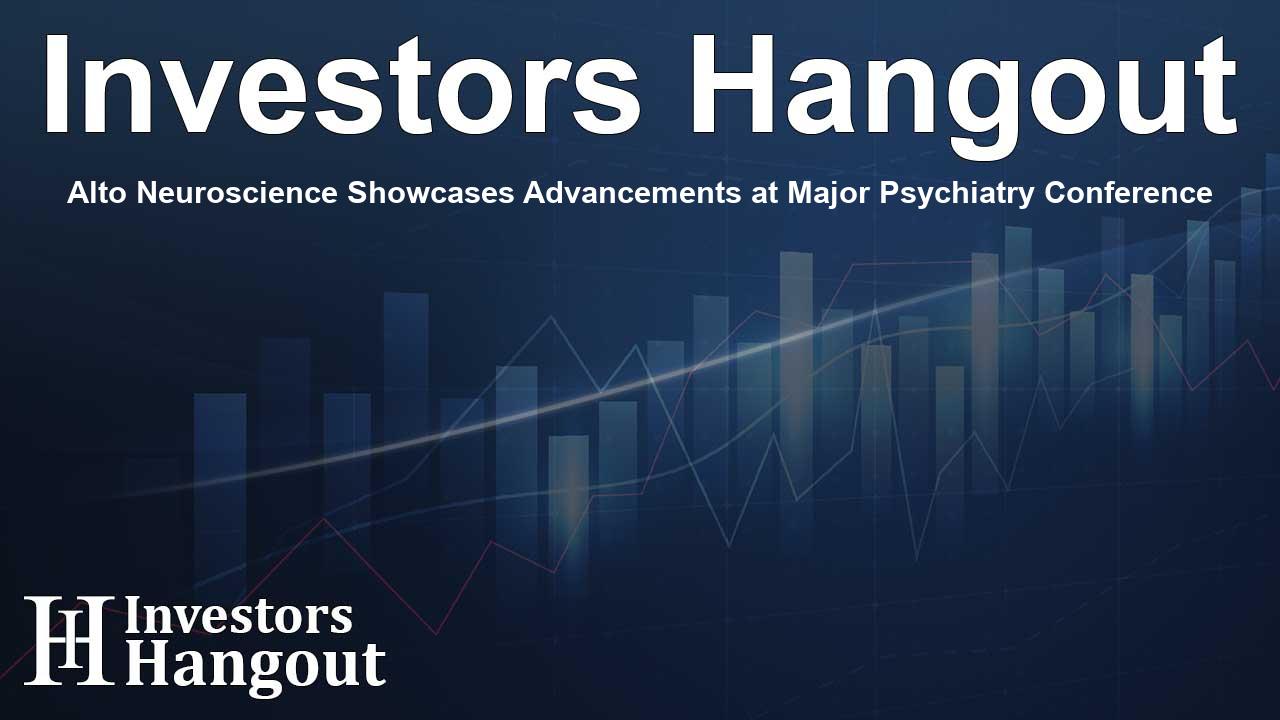Alto Neuroscience Showcases Advancements at Major Psychiatry Conference

Alto Neuroscience Advances Neuropsychiatry at Key Conference
Alto Neuroscience, Inc. (NYSE: ANRO), a company at the forefront of clinical-stage biopharmaceuticals, recently had a significant presence at a major psychiatry conference focused on neuropsychopharmacology. During this pivotal event, held in December, Alto presented multiple groundbreaking findings related to their ongoing research and innovative methodologies.
Highlights of the Conference Presentations
The conference served as a platform to reveal important advancements in Alto's pipeline. With a continual emphasis on their precision psychiatry platform, the presentations focused on key findings related to neurobiological initiatives and drug candidates. Dr. Amit Etkin, the founder and CEO of Alto Neuroscience, shared insights that contribute to an enhanced understanding of their candidate, ALTO-300.
ALTO-300 and its Impact
ALTO-300 has garnered attention due to its unique mechanism of action. As an antidepressant exhibiting both melatonin agonistic and 5-HT2C antagonistic properties, it shows promising neurobiological effects. These effects include enhancing dopaminergic and noradrenergic inputs to the frontal cortex, crucial for treating major depressive disorders (MDD). During the conference, researchers highlighted that this compound may be predictive of patient responses through specific EEG biomarkers.
New Mechanistic Insights
The findings offered by Alto revealed significant connections between ALTO-300 and dopaminergic activity. Greater levels of sample entropy were identified as indicators of both the drug's efficacy and neural stability. This correlation provides measurable insights into how patients may respond to treatments, elucidating the complex nature of aspects such as anhedonia in depression.
Presentation Titles and Their Significance
Each presentation featured unique contributions to psychiatric research and treatment methodologies. One significant title was "Neural and Molecular Mechanistic Correlates of an EEG Biomarker Predictive of the Antidepressant Response to ALTO-300 in Patients with Major Depression." This segment discussed how the ALTO-300 biomarker indicates reduced neural connectivity and may reflect increased 5-HT2C receptor activity.
Reward Processing in Major Depression
Another critical presentation titled "Validation of Assessments for Reward Processing for Use in a Phase 2 Study of a Novel Histamine H3 Inverse Agonist, ALTO-203, in Major Depression" addressed the importance of better tools in measuring patient response. The development of novel computerized cognitive tests improves the understanding of motivation and reward processing for individuals battling depression.
Understanding Cognitive Impairment
From the ongoing Texas Resilience Against Depression study, findings indicated that cognitive impairment (CI) is a concerning phenomenon in patients suffering from MDD. The study uncovered that 51% of participants exhibited traits associated with CI, leading to implications for necessary treatment adjustments and therapeutic focus.
Interim Analysis Plans
Looking ahead, Alto Neuroscience plans an interim analysis of the ALTO-300 Phase 2b trial. This analysis aims to refine patient selection and study outcomes based on previous trials and research insights. The anticipation of a comprehensive review for optimizing the trial design reflects Alto's dedication to precise, effective treatment approaches.
About Alto Neuroscience
Alto Neuroscience is committed to redefining the field of psychiatry through innovative treatments. By utilizing advanced neurobiological insights, the company endeavors to develop personalized therapeutic options tailored for mental health conditions, such as depression and schizophrenia. The company's Precision Psychiatry Platform™ aids in identifying biomarkers that help in creating targeted treatments for patients.
Frequently Asked Questions
What is Alto Neuroscience focused on?
Alto Neuroscience is focused on developing precision medicines for neuropsychiatric disorders, including depression and schizophrenia.
What was highlighted in Alto's presentations at the conference?
Alto showcased advancements in their research, particularly regarding the ALTO-300 drug and EEG biomarkers predictive of antidepressant responses.
How does ALTO-300 work?
ALTO-300 acts as a melatonin agonist and 5-HT2C antagonist, providing neurobiological effects crucial for treating major depressive disorders.
What is the significance of sample entropy in Alto's findings?
Sample entropy relates to neural connectivity and can predict patient responses to ALTO-300, revealing insights into the drug's efficacy.
What is the next step for Alto Neuroscience?
Alto Neuroscience plans to conduct an interim analysis for its ongoing Phase 2b trial of ALTO-300 to optimize treatment approaches based on earlier findings.
About The Author
Contact Henry Turner privately here. Or send an email with ATTN: Henry Turner as the subject to contact@investorshangout.com.
About Investors Hangout
Investors Hangout is a leading online stock forum for financial discussion and learning, offering a wide range of free tools and resources. It draws in traders of all levels, who exchange market knowledge, investigate trading tactics, and keep an eye on industry developments in real time. Featuring financial articles, stock message boards, quotes, charts, company profiles, and live news updates. Through cooperative learning and a wealth of informational resources, it helps users from novices creating their first portfolios to experts honing their techniques. Join Investors Hangout today: https://investorshangout.com/
The content of this article is based on factual, publicly available information and does not represent legal, financial, or investment advice. Investors Hangout does not offer financial advice, and the author is not a licensed financial advisor. Consult a qualified advisor before making any financial or investment decisions based on this article. This article should not be considered advice to purchase, sell, or hold any securities or other investments. If any of the material provided here is inaccurate, please contact us for corrections.
